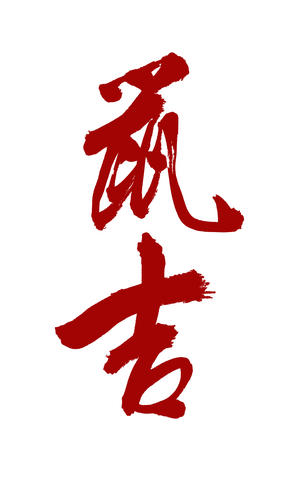Putting pigs behind us, today marks the beginning of the Year of the Rat, the first animal in the Chinese zodiac.
Dirty little vermin you might say, with no place in the exulted pantheon of heavenly symbols that make up the Chinese zodiac. But the rat's cunning is legendary: It got into the zodiac by winning a race using brainpower rather than physical power. As with most myths, there are many versions of the story that follows, but the general idea is this.
Back in deepest antiquity, the story goes, the Jade Emperor, ruler of heaven, decided to organize a race for all the animals of the earth. The stakes: The first 12 to finish would be included in the cycle of zodiac animals by which the heavens and time itself were organized. The cat and the rat, both lazy creatures, weren't sure they could get up in time for the big event. They asked the ox to wake them at dawn on the day of the race. The big day came along and the ox dutifully went to wake them. Try as it might, it couldn't. They just murmured, rolled over and went back to sleep.

ILLUSTRATION: JERRY HUANG
Unable to wake them, the ox coaxed the two lazy animals onto his back and set off to join the race. The cat and rat remained there when the race began.
Fast forward to the end of the race. The ox, with his enormous strength and determination, was ahead of the rest. The final hurdle was a river, and as the ox waded across, the rat finally woke. It realized it could never beat the cat in the final sprint to the finish, so grasping the chance fate offered, it pushed the still-sleeping cat into the river. When the ox got to the other side, the rat jumped off its back and scampered across the finish line just ahead of the ox. That's why in the Chinese zodiac the rat is always listed first and is followed by the ox. It is also why the cat is not in the Chinese zodiac and the enmity between cat and mouse continues to this day.
BRAIN VS brawn
The relationship between the rat and the ox, which helped the rat win the race, is one of the most highly regarded pairings within the zodiac. The rat represents intelligence, but without the diligence of the ox this easily degenerates into cunning. On the other hand, the ox with its enormous strength could have made it to the finish line first if it had been a little sharper. Put the qualities of the two together and you have an unbeatable combination. But how to make that combination come about depends on your stars.
Unfortunately, the undesirable characteristics of the rat have become more commonplace in everyday language, with the lexicon focusing more on their cunning than their intelligence. "The rat sees only an inch in front of its face" (鼠目寸光, shumuchunguang), is used to describe a person who cannot see beyond immediate personal gain. "Head of a water deer and face of a rat" (獐頭鼠面, zhangtoushumian) refers to someone thoroughly untrustworthy and "ruined by rat-like suspicion" (鼠首僨事, shushoufenshi) refers to a person full of hesitation and suspicion who undermines a joint project.
It's not a good record, and a person born in the year of the rat might well feel that he or she is like "a rat crossing the road" (老鼠過街, laoshuguojie) - a target of common abuse (人人喊打, renrenhanda).
Even when we look to the fortune-tellers, it is clear that despite the rat coming first in the list of zodiac symbols, it is a birth sign loaded with bad character traits. The rat is lazy (it needed the ox to take it to the races), an opportunist and a gossip. Looking on the brighter side, the rat is sociable, imaginative and adaptable. They are also sensitive to their environment, and it is well known that rats are the first to leave a sinking ship. It is a quality they can turn to their advantage. In general, people born in the Year of the Rat are suited to be artists, inventors, revolutionaries and politicians. It might be worth taking a tally of the number of rats in government.
So another cycle of the Chinese zodiac begins. It's worth noting that while the rat managed to win the race despite its laziness, the pig, which came in 12th, was last because it stopped mid-race to eat and take a nap.
But however you to get through the finish line in the Year of the Rat, we at the Taipei Times wish you a very happy New Year and the best of fortune.

Feb. 17 to Feb. 23 “Japanese city is bombed,” screamed the banner in bold capital letters spanning the front page of the US daily New Castle News on Feb. 24, 1938. This was big news across the globe, as Japan had not been bombarded since Western forces attacked Shimonoseki in 1864. “Numerous Japanese citizens were killed and injured today when eight Chinese planes bombed Taihoku, capital of Formosa, and other nearby cities in the first Chinese air raid anywhere in the Japanese empire,” the subhead clarified. The target was the Matsuyama Airfield (today’s Songshan Airport in Taipei), which

On Jan. 17, Beijing announced that it would allow residents of Shanghai and Fujian Province to visit Taiwan. The two sides are still working out the details. President William Lai (賴清德) has been promoting cross-strait tourism, perhaps to soften the People’s Republic of China’s (PRC) attitudes, perhaps as a sop to international and local opinion leaders. Likely the latter, since many observers understand that the twin drivers of cross-strait tourism — the belief that Chinese tourists will bring money into Taiwan, and the belief that tourism will create better relations — are both false. CHINESE TOURISM PIPE DREAM Back in July

Could Taiwan’s democracy be at risk? There is a lot of apocalyptic commentary right now suggesting that this is the case, but it is always a conspiracy by the other guys — our side is firmly on the side of protecting democracy and always has been, unlike them! The situation is nowhere near that bleak — yet. The concern is that the power struggle between the opposition Chinese Nationalist Party (KMT) and their now effectively pan-blue allies the Taiwan People’s Party (TPP) and the ruling Democratic Progressive Party (DPP) intensifies to the point where democratic functions start to break down. Both

This was not supposed to be an election year. The local media is billing it as the “2025 great recall era” (2025大罷免時代) or the “2025 great recall wave” (2025大罷免潮), with many now just shortening it to “great recall.” As of this writing the number of campaigns that have submitted the requisite one percent of eligible voters signatures in legislative districts is 51 — 35 targeting Chinese Nationalist Party (KMT) caucus lawmakers and 16 targeting Democratic Progressive Party (DPP) lawmakers. The pan-green side has more as they started earlier. Many recall campaigns are billing themselves as “Winter Bluebirds” after the “Bluebird Action”